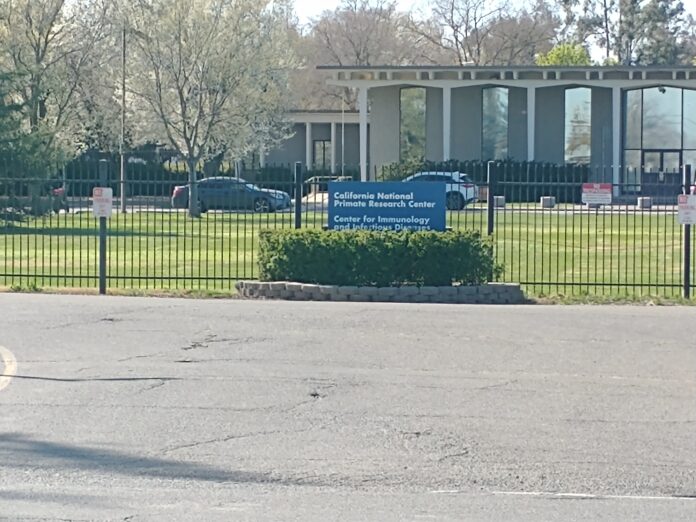The Physicians Committee for Responsible Medicine filed a lawsuit against the university over its treatment of primates in relation to Elon Musk’s Neuralink project
By ISABELLA KRZESNIAK — campus@theaggie.org
On Feb. 10, the Physicians Committee for Responsible Medicine submitted a complaint to the U.S. Department of Agriculture (USDA) against UC Davis for allegedly violating the Animal Welfare Act in its research with Neuralink, a company owned by Elon Musk. Additionally, the Physicians Committee filed a lawsuit against the university with Yolo County to release documentation related to the research in accordance with the California Public Records Act (CPRA) on the same day.
From 2017 to 2020, Neuralink worked with the university at the California National Primate Research Center (CNPRC) and experimented on primates to develop technology that would enable users to interact with computers using their mind. The Physicians Committee previously filed a lawsuit for the release of research documentation for these experiments in 2021, and the committee based its USDA complaint this year on the information that the university disclosed following this initial suit.
The Physicians Committee is requesting documentation from experiments in which 23 monkeys were said to be mistreated in the committee’s press release. According to the lawsuit, researchers implanted electrodes in their brains, removed parts of their skulls, used unapproved substances on them and did not provide sufficient veterinary care.
People for the Elimination of Animal Cruelty through Education (PEACE), a club at UC Davis that advocates for animal rights, stated that the university should take responsibility for its actions. In 2019, ASUCD approved PEACE’s Sentience Resolution, which called on the university to recognize animals as conscious beings.
“UC Davis and the CNPRC should take accountability for their violations and admit how they are disregarding the Sentience Resolution,” PEACE said in a statement on Feb. 20. “The CNPRC needs to be reformed to end their cruel experiments on non-human animals and utilize modern methods of experimentation, valid in the twenty-first century.”
According to the Physicians Committee’s most recent lawsuit, UC Davis is withholding information in order to prevent a “chilling effect” on future academic research. Amanda Banks, the president of the California Biomedical Research Association, said that research prospects could experience a dampening effect as a result of the empathy that people feel for primate test subjects.
“The general public has a sense of familiarity and love for primates, but it also creates a real sense of unease about the use of primates in medical research,” Banks said. “It’s really going to make the general public uncomfortable with the idea of research, which can affect research funding and can affect how people react to primate research in general.”
According to PEACE, the university is using this effect as a pretext for animal abuse.
“The ‘chilling effect’ the university claims to be concerned with is simply an excuse to hide the horror that has gone on behind closed doors,” the PEACE statement reads. “Releasing some visual information to the public at the very least should not invalidate or halt any research.”
Third-year sustainable agriculture and food systems major Emma Talbot, who has worked with non-primate animals for her courses in the past, said the university’s lack of discussion of these events seems secretive.
“This could really ruin a school that prides itself on animal science and being very connected with animals,” Talbot said.
The Physicians Committee argues that since the university is a public institution, all animal research documentation is public pursuant to the CPRA. According to Andy Fell, the news and media relations specialist at UC Davis who responded on behalf of the CNPRC, the university fully complied with the CPRA in response to the Physicians Committee’s request.
“Additional materials have been supplied to the Physicians Committee since the conclusion of the research agreement with Neuralink,” the university said in its official statement.
Banks said she believes the university is a model for sharing research.
“The university has been very transparent,” Banks said. “I certainly don’t think they’re hiding anything.”
According to the Physicians Committee’s second lawsuit, Neuralink has consistently shared their research. During Neuralink’s time at the CNPRC, they released footage of primates, including a monkey named Pager, who played the video game “Pong” using its mind.
Regarding the treatment of primates, in its official statement, the university said that all animals were provided the best possible care.
“UC Davis staff provided veterinary care including round-the-clock monitoring of experimental animals,” the statement reads. “When an incident occurred, it was reported to the [Institutional Animal Care and Use Committee], which mandated training and protocol changes as needed.”
Every research institution has its own Institutional Animal Care and Use Committee (IACUC), which reviews all proposed experiments using animals. The research that took place from 2017 to 2020 was approved by the UC Davis IACUC.
“Ethical questions are considered all throughout the animal research process,” said Jim Newman, the director of strategic communications from Americans for Medical Progress.
“In short, the research community constantly asks itself whether the benefits of the information we are trying to obtain outweigh any negative impacts on animals.”
In Banks’ view, animal research is often the subject of public scrutiny.
“If it’s sensational or horrific, it gets more press,” Banks said. “Certainly, we don’t know enough now, and the USDA is investigating. The loss of animal life is tragic, but sometimes it’s necessary as part of research.”
Written by: Isabella Krzesniak — campus@theaggie.org




